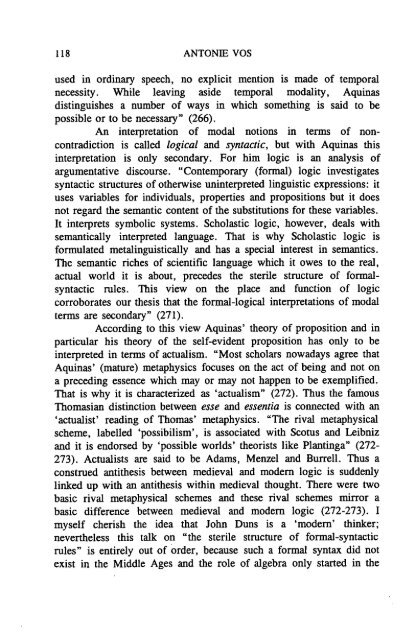Jaarboek Thomas Instituut 1997 - Thomas Instituut te Utrecht
Jaarboek Thomas Instituut 1997 - Thomas Instituut te Utrecht
Jaarboek Thomas Instituut 1997 - Thomas Instituut te Utrecht
You also want an ePaper? Increase the reach of your titles
YUMPU automatically turns print PDFs into web optimized ePapers that Google loves.
118 ANTONIE VOS<br />
used in ordinary speech, no explicit mention is made of <strong>te</strong>mporal<br />
necessity. While leaving aside <strong>te</strong>mporal modality, Aquinas<br />
distinguishes a number of ways in which something is said to be<br />
possible or to be necessary" (266).<br />
An in<strong>te</strong>rpretation of modal notions in <strong>te</strong>rms of noncontradiction<br />
is called logical and syntactic, but with Aquinas this<br />
in<strong>te</strong>rpretation is only secondary. For him logic is an analysis of<br />
argumentative discourse. "Con<strong>te</strong>mporary (formal) logic investiga<strong>te</strong>s<br />
syntactic structures of otherwise unin<strong>te</strong>rpre<strong>te</strong>d linguistic expressions: it<br />
uses variables for individuals, properties and propositions but it does<br />
not regard the semantic con<strong>te</strong>nt of the substitutions for these variables.<br />
It in<strong>te</strong>rprets symbolic sys<strong>te</strong>ms. Scholastic logic, however, deals with<br />
semantically in<strong>te</strong>rpre<strong>te</strong>d language. That is why Scholastic logic is<br />
formula<strong>te</strong>d metalinguistically and has a special in<strong>te</strong>rest in semantics.<br />
The semantic riches of scientific language which it owes to the real,<br />
actual world it is about, precedes the s<strong>te</strong>rile structure of formalsyntactic<br />
rules. This view on the place and function of logic<br />
corrobora<strong>te</strong>s our thesis that the formal-logical in<strong>te</strong>rpretations of modal<br />
<strong>te</strong>rms are secondary" (271).<br />
According to this view Aquinas' theory of proposition and in<br />
particular his theory of the self-evident proposition has only to be<br />
in<strong>te</strong>rpre<strong>te</strong>d in <strong>te</strong>rms of actualism. "Most scholars nowadays agree that<br />
Aquinas' (mature) metaphysics focuses on the act of being and not on<br />
a preceding essence which mayor may not happen to be exemplified.<br />
That is why it is charac<strong>te</strong>rized as 'actualism" (272). Thus the famous<br />
<strong>Thomas</strong>ian distinction between esse and essentia is connec<strong>te</strong>d with an<br />
'actualist' reading of <strong>Thomas</strong>' metaphysics. "The rival metaphysical<br />
scheme, labelled 'possibilism', is associa<strong>te</strong>d with Scotus and Leibniz<br />
and it is endorsed by 'possible worlds' theorists like Plantinga" (272-<br />
273). Actualists are said to be Adams, Menzel and Burrell. Thus a<br />
construed antithesis between medieval and modem logic is suddenly<br />
linked up with an antithesis within medieval thought. There were two<br />
basic rival metaphysical schemes and these rival schemes mirror a<br />
basic difference between medieval and modem logic (272-273). I<br />
myself cherish the idea that John Duns is a 'modem' thinker;<br />
nevertheless this talk on "the s<strong>te</strong>rile structure of formal-syntactic<br />
rules" is entirely out of order, because such a formal syntax did not<br />
exist in the Middle Ages and the role of algebra only star<strong>te</strong>d in the








